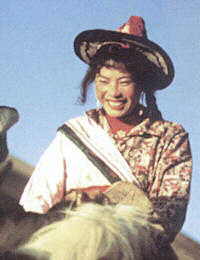 The Yugur ethnic minority has a population of about 10,569 (by 1990), with 90% of them living in the South Yugur Autonomous County, and the rest in the Huangnibao area of Jiuquan City in Gansu province. (In Chinese, "Yugur" means "wealth and stability").
The Yugur ethnic minority has a population of about 10,569 (by 1990), with 90% of them living in the South Yugur Autonomous County, and the rest in the Huangnibao area of Jiuquan City in Gansu province. (In Chinese, "Yugur" means "wealth and stability").
For historical reasons, three different languages are spoken by the Yugur people: a Turkic Austronesian of the Altaic Phylum (Raohul), which is used by the Yugur people in the western part of the autonomous county; a Mongolian Austronesian of the same language family (Engle), used by those in the eastern part of the county; and, the Chinese language, used by Yugur in Huangnibao. The Yugur languages do not have their own characters, and Chinese characters are the written language of this area.
The Yugur originated from the Huihe (Tiele) people who were nomads around the Erhui River during the Tang Dynasty (618-907). In the middle of 9th century, beset by snowstorms, feuds within the ruling group, and attacks from the Turkic Kirgiz, a group of Huihe migrated to the areas around Dunhuang, Zhangye and Wuwei in the Hexi Corridor -- the most fertile area in central-western Gansu Province. With the passage of time, they gradually developed into a new ethnic minority, the Yugur. According to documents, the Yugurs had a lot of names in the past, such as Huangfan, Xifan, etc. In 1953, following consultation of the ethnic minority, it agreed on the official name of the Yugur ethnic minority, meaning rich and stable. In February and April of 1954, the Sunan Yugur Autonomous County and Jiuquan Huangnibao Yugur Autonomous Township were established.
Animal husbandry is the major industry of the Yugur people, but some have turned to agriculture. In industry, the area now has farm and livestock-breeding machinery factories, carpet, fur, and food processing industries, and coal mining. Milk tea plays an important part in their daily life.
The Yugurs have a rich literary tradition handed down orally, such as legends, folk tales, proverbs and ballads. They are skilled at the plastic arts, weaving beautiful patterns on bags, carpets and harnesses.
The Yugur people believe in the Yellow Lamaism, and their customs and habits are similar to the Tibetans'.
Vast stretches of exuberant prairies in the region help make the Yugurs an open, generous people. There, every visitor can feel the warmth and hospitality. They welcome their guests with kadag (a long piece of white cloth presented to express great respect and wishes of good luck for the guests).
